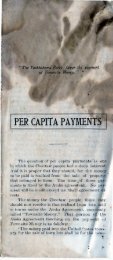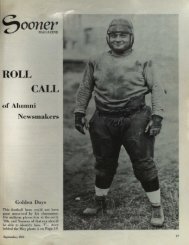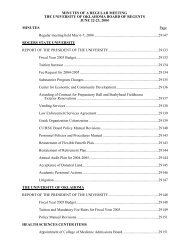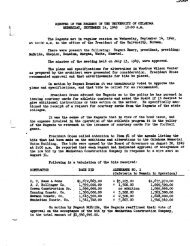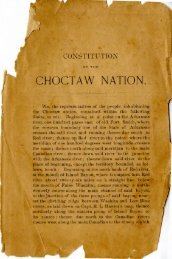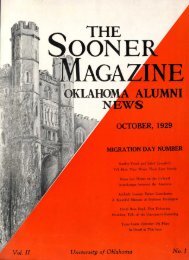Notice of Copyright Published and unpublished ... - Digital Collections
Notice of Copyright Published and unpublished ... - Digital Collections
Notice of Copyright Published and unpublished ... - Digital Collections
You also want an ePaper? Increase the reach of your titles
YUMPU automatically turns print PDFs into web optimized ePapers that Google loves.
<strong>Notice</strong> <strong>of</strong> <strong>Copyright</strong><br />
<strong>Published</strong> <strong>and</strong> <strong>unpublished</strong> materials may be protected by <strong>Copyright</strong> Law (Title 17, U.S.<br />
Code). Any copies <strong>of</strong> published <strong>and</strong> <strong>unpublished</strong> materials provided by the Western<br />
History <strong>Collections</strong> are for research, scholarship, <strong>and</strong> study purposes only.<br />
Use <strong>of</strong> certain published materials <strong>and</strong> manuscripts is restricted by law, by reason <strong>of</strong> their<br />
origin, or by donor agreement. For the protection <strong>of</strong> its holdings, the Western History<br />
<strong>Collections</strong> also reserves the right to restrict the use <strong>of</strong> unprocessed materials, or books<br />
<strong>and</strong> documents <strong>of</strong> exceptional value <strong>and</strong> fragility. Use <strong>of</strong> any material is subject to the<br />
approval <strong>of</strong> the Curator.<br />
Citing Resources from the Western History <strong>Collections</strong><br />
For citations in published or <strong>unpublished</strong> papers, this repository should be listed as the<br />
Western History <strong>Collections</strong>, University <strong>of</strong> Oklahoma, Norman, Oklahoma.<br />
An example <strong>of</strong> a proper citation:<br />
Oklahoma Federation <strong>of</strong> Labor Collection, M452, Box 5, Folder 2. Western History<br />
<strong>Collections</strong>, University <strong>of</strong> Oklahoma, Norman, Oklahoma.
T-620-3 (Third <strong>of</strong> Six" Interviews)<br />
MARY LANE RED EAGLE,'.QUAPAW<br />
INTERVIEWED BY: VELMA NEIBERDING<br />
INTERVIEW'DATE: DECEMBER 15, I969<br />
TRANSCRIBED BY: MONSTTE COOMBES<br />
TRANSCRIPTION CHECKED BY: MONETTE COOMBES<br />
GENERAL SUBJECT:<br />
QUAPAW WORDS; CLANS-;* SOME FAMILY HISTORY; MEDICINE<br />
AND HERBS . « « •<br />
1<br />
BACKGROUND OF INFORMANT: - "<br />
Mary Lane.Red Eagle was born around 1891 on Spring'River in*<br />
northeastern Oklahoma. She lived with an aunt until -she was sent<br />
to Seneca Indian School at "Wy<strong>and</strong>otte, Oklahoma <strong>and</strong> then Haskeil<br />
Institute in Lawrence, Kansas. Her aunt died while she was attending<br />
Haskeil, <strong>and</strong> she then went to the Sisters <strong>of</strong> Loretta Academy<br />
in Kansas City, she studied music <strong>and</strong> was a student at the<br />
Kansas Conservatory <strong>of</strong> Music .where she met Madame Schumah Heinke<br />
<strong>and</strong> Lily Pons. Mrs. Re.d Eagle has traveled extensively <strong>and</strong> has<br />
sung before many audiences. She came back to Miami, -Oklahoma to<br />
make her home <strong>and</strong> has lived here for .several years. Mary was<br />
married tu Wa-Go-She, an Osage <strong>and</strong> inherited his headright when,<br />
he died. Her first.husb<strong>and</strong> was Leroy Red Eagle. Her father was<br />
•a medicine man (Big Jim Lane 1 ). ^<br />
Note: The other interviews on this tape are: Ruby Diebold, Seneca-Cayuga<br />
William Shawnee, Shawnee<br />
Language Class, Seneca<br />
Ruby Diebold, Speaker<br />
Emelece Reynolds., Cherokee<br />
Language Class, Seneca<br />
• Robert White, Speaker<br />
A<br />
\
\•<br />
*<br />
Mary Lane Red Eagle, Quapaw<br />
(We are now going to talk to Mrs. Mary Red Eagle, member <strong>of</strong> the Quapaw tribe.<br />
• She's considered a historian <strong>of</strong> the tribe <strong>and</strong> is one <strong>of</strong> the few who speak the<br />
. language. Mrs. Red Eagle is going to give us some Quapaw words. Mary, now<br />
what is the word for God?)<br />
• Wah-kon-tah.<br />
The word for God is Wah-kon-tah, <strong>and</strong> the meaning would be that<br />
He is the highest being <strong>and</strong> knows all.<br />
(What is the word for corn?) ,<br />
The word for corn is wah-tu-zah^/?). . ' •<br />
(Do you think <strong>of</strong> some other words or some sentences you-could say for me?)<br />
• Well, the word for bird is wah-zhinga (?). Aad well,*the word for moon is<br />
meum-bah. "<br />
(Do you have a word for stars?)<br />
And the word fdr start is' me-gu-a (?).<br />
'<br />
v<br />
> • (Do you remember the clans <strong>of</strong> the Quapaw? The*clans?) ^<br />
%, I don't. They're—course we have the clans the same as other tribes, but<br />
I don't really remember. As for myself I--I believe that I have forgotten<br />
the* clan that I belong to.' * ' (<br />
(I_believe you are a member <strong>of</strong> the Beaver clan if I—)<br />
.x" .<br />
(Irrelevant words).<br />
\<br />
Do you want me to say my name first--Mary Lane? My name is Mary Lane, <strong>and</strong><br />
I was bornton Spring River <strong>and</strong>—'course that's Quapaw reservation.<br />
And the<br />
Storing River—I was born where the old village blacksmith shop is—was--*<br />
well it's still known as that name.<br />
And I love to go down there as it is<br />
beautiful around there—foliage, trees are just beautiful.<br />
And <strong>of</strong> course it<br />
•* makes me quite lonesome to* see my old home place.<br />
vSome <strong>of</strong> /our folks are buried there, I believe Mary?)<br />
Yes. Nearly all <strong>of</strong> my people are ouried there. And there were onl^ two<br />
children <strong>of</strong> # us, ray brother <strong>and</strong> I.<br />
And.<strong>of</strong> course he'd ouried there with my<br />
father <strong>and</strong> my mother <strong>and</strong> my relatives. But there are quite a few graves<br />
• ' -1- ' . *
•{He was a doctor- also, wasn'.t: he — sort <strong>of</strong> a'herb doctor?) ..<br />
He was the doctor <strong>of</strong> the tribe. And he doctored <strong>of</strong> course with the root—<br />
-2- T-620-3<br />
there.<br />
'Course there wouldn't be seen or you couldn't f.ind them now because<br />
it's good many years ago. _ '<br />
(What was your mother's name?)<br />
My mother's name was Julia Ann Sactaw.<br />
That was—Sactaw was her Potawatomi<br />
name." She^'was a'Potawatomi, member <strong>of</strong> the Quapaw-Potawatomi tribe from St.<br />
Marys, Kansas. And it seems though, the history goes,- I believe that there<br />
was a/,preacher that worked among the Indians at that time <strong>and</strong> he happened<br />
to be*"up• around St. ^Marys, Kansas <strong>and</strong> he said he would like to go down south<br />
<strong>and</strong> see where he could find a reservation where he could work.<br />
And he'd like<br />
to take some people down therewith him, because'they helped him when he was<br />
in his prayers,' <strong>and</strong> in his singing—they all learned how to sing. And so<br />
he wanted someone you know, to go along with him <strong>and</strong> to help him.<br />
So there<br />
was a bunch <strong>of</strong>; people--I don't know how many families left, but -they did—<br />
v<br />
they migrated dowi south tbward Kansas.<br />
And I don't know much about the<br />
history, but it seems though that they camped along the northern part <strong>of</strong> Kansas<br />
<strong>and</strong> small.Tpox broke out.<br />
Ancf that's where we lost quite a number <strong>of</strong> the<br />
Quapaws there.<br />
But they* finals came on in--further into Oklahoma <strong>and</strong> began<br />
to settle around, <strong>and</strong> <strong>of</strong> course, around north <strong>of</strong> Baxter Springs, Kansas <strong>and</strong><br />
, / • • s<br />
l\ .• - -<br />
then further 1 on south. And—but they always wanted water <strong>and</strong> they always<br />
I *' ' *<br />
saw to it that they would camp along the river so that they would have plenty<br />
• . / * * ' - • • * .<br />
' <strong>of</strong> water fcjr what little stock that they had--left, you know, coming down<br />
toward Oklahoma. And <strong>of</strong> course then I was born there at the village black-,<br />
smith sho£>, as'I told you there at the little ford.<br />
(What"was your father's name?) , > 0 *<br />
My father'.: name was George Lane, but he had a nickname—he .was a^ir; feli^.v<br />
<strong>and</strong> they--his friends nickname'd him "Big George Lane."<br />
He was always-.known<br />
thtt: ' ,
-3- . - T-62Q-3<br />
with the herbs <strong>and</strong> sometimes the flower. But the flower—the flower, I have "<br />
/<br />
, forgotten the name, but I can just see it <strong>and</strong> it has a beautiful odor. And<br />
it was made more for a tea, for a bath like you have a sore throat <strong>and</strong> you<br />
''have a headache, you put this tea, you'know across your head. And this tea,<br />
• * i<br />
why you bathed in it <strong>and</strong> where ever it hurt Tou.<br />
And they used that quite<br />
a lot for medicine too.<br />
(You don't remember it's' name ?) - f<br />
Well, I don't remember it's name, but it's a long stem <strong>and</strong> it's has a—it's<br />
a,purple—purple flower <strong>and</strong> the leaves are real slender.<br />
There are a whole<br />
lot <strong>of</strong> leaves around that little center part.<br />
And they are-purple <strong>and</strong> they<br />
have a beautiful odor.<br />
I can't--! don't know, it doesn't smell like camphor,<br />
'but I don't remember the name.<br />
But I know that my aunt used that cyjite a<br />
lot in headaches, <strong>and</strong> wherever your' leg aches arid whatever you had that was,<br />
paining ^ou, why they just made kind <strong>of</strong> a planter like <strong>and</strong> put there.<br />
(Do you remembe» arty <strong>of</strong> the roots they used?)<br />
Well, no, I don't. I don't remember any <strong>of</strong> the rpots, but there were plenty<br />
I know, that, they-have for indigestion for their stomach trouble, why they<br />
dug' <strong>and</strong> they had—they'd make tea out <strong>of</strong> that too <strong>and</strong> they would chew some<br />
<strong>of</strong> that.<br />
And that way it seems though they• were.-quite relieved. ' They used<br />
to<br />
•



